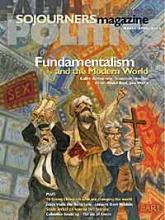JIM WALLIS' ARTICLE in the January-February 2002 issue ("Hard Questions for Peacemakers") was helpful in summarizing efforts of theologians of nonviolence to wrestle with the question of how to resist terrorism. Hopefully some practical considerations based on the principles of Christian nonviolence may evolve that might find their way into political thinking. However, like the writer of your first letter in this issue, Dale Painter, I was left wishing that more thinking based upon the plain teachings of Jesus might have been included. Granted that the political leaders of the modern world consider his teachings impractical and unworkable. [But] I would hope we would at least be trying to point our national leaders toward options that have their base in the greatest teacher of the things that make for peace.
For instance, important to Jesus in re-establishment of broken relationships seems to have been a confession of having wronged the offended and a willingness to make an effort to recompense or right the wrong as best we can. If, as bin Laden said, his actions were based upon past actions of the United States' foreign policy affecting the Arab people, and if, as Wallis said, it would not be hard to document offenses of our foreign policy as these relate to the Arab people over the past many years, why should we not at least try to understand the intensity of the anger that resulted in such inhuman acts on the part of bin Laden and al Qaeda as a first step in following Jesus' way?
Read the Full Article
